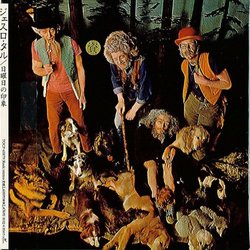Cutting Edge Debut
Lonnie E. Holder | Columbus, Indiana, United States | 04/19/2005
(5 out of 5 stars)
"Debut albums are often the stuff of great discussion and controversy. In the case of "This Was", Jethro Tull appeared on the music scene largely unheralded. Perhaps part of the reason was the many of the songs were strongly blues influenced and appeared at a time when blues were making a musical comeback, thus becoming somewhat lost in the flood of other music. It's also possible that the broad variation of musical styles, a characteristic of Tull throughout their history, made the album difficult to classify, and rather than deal with a group that fit no single category, reviews were lukewarm. Current reviews hail "This Was" for its creativity and for the eclectic collection of music that defied 1968 conventions.
This album remains unusual, even considering all the albums that have been released since 1968. There are strong blues songs, Ian's rock/jazz/blues style of playing a flute, and flavors of rock and folk; clearly not a concept album, but a group of guys getting together and throwing what they had, which was very good, onto an album.
The album kicks off with "My Sunday Feeling", a lament about the aftereffects of Saturday night. The flute in this song modifies the blues-rock guitar riffs and drums to provide a jazz twist. Ian's vocals could similarly be either blues or jazz. Regardless of how you classify the song, it's heartfelt and creative.
"Some Day the Sun Won't Shine for You" is all blues, with an acoustic guitar and harmonica flavoring the song from the outset. The vocals have a classic blues sound to them that fit well with the acoustic instruments; a mellow breakup song advising the ex-girlfriend that some day she'll have a bad day.
"Beggar's Farm" begins with a repetitive series of blues-flavored rock notes. During the bridge the electric guitar and flute increase the blues flavor substantially. The theme here is a significant other with an outside relationship. The song advises her that she's going down in a bad way, and one day she'll end up on the beggar's farm, where perhaps he will see her (if she asks him nicely). It seems that Ian Anderson and Mick Abrahams were feeling down while writing these songs, as the next song, "Move on Alone", seems to indicate. Here the girlfriend has gone, and he's trying to overcome his grief to get on with his life. The blues instrumentation in this song is jazz-flavored with brass.
The next two songs are instrumentals. The first, "Serenade for Cuckoo", sounds like a piece for a jazz combo, with Ian's flute providing a substitute for a horn. The lead guitar is playing blues, with mellow riffs. A very laidback piece. "Dharma for One" follows with a faster beat. While blues flavor this song as well, it is rock at heart. You can even hear elements of progressive rock in this song, including a portion that sounded to me a little like some of King Crimson's later style. The only strange thing about this instrumental is a drum solo that may have been a bit of 1968 experimentation on Jethro Tull's part.
The next song is "It's Breaking Me Up", where the group moves into solid blues. This song joins the second track as the two most solidly blues songs on this CD. Ian plays the harmonica like a veteran blues man, and you might think you were in a New Orleans blues bar instead of listening to Jethro Tull.
We jump from a classic blues song to a nearly psychedelic instrumental, "Cat's Squirrel". Each time I hear this piece I am reminded of early Black Sabbath. For much of the song the lead guitar and bass guitar pound out hard rock sounding riffs, and when the drums take off you could easily think you are listening to an early Black Sabbath recording; the heaviest cut on this CD.
"A Song for Jeffrey" is the last song on the CD before the short instrumental "Round" (excluding the three relatively unnecessary "extra" tracks). Ian Anderson sings this song with a blues-like guttural vocal, yet the instrumentation backing Ian is rock, perhaps you could even consider this hard rock. "Round" finishes off the CD with a jazz sound, combining piano, drums and flute. The piece is short and to the point.
I am not going to provide any discussion of the three extra tracks. Usually extra tracks add to an album. In this case, the three extras are unnecessary distractions, given that I have a lot of Tull CDs. Further, the mixture of eras is inappropriate.
There is a quote on the liner for this CD that states "'This Was' how we were playing then - but things change." Little did anyone realize how true that quote was when Jethro Tull was soon to release "Aqualung" and "Thick as a Brick", among others. More importantly, Jethro Tull was already experimenting with musical elements that would eventually be termed progressive, though this CD is more blues and jazz-flavored rock than progressive. Jethro Tull helped show the rest of the rock world that if you were brave, you could stretch the limits of what could fit onto a single album pretty far. This debut album helped define that this group had no definition, and has never needed one, because they have always defined themselves.
"


 Track Listings (13) - Disc #1
Track Listings (13) - Disc #1